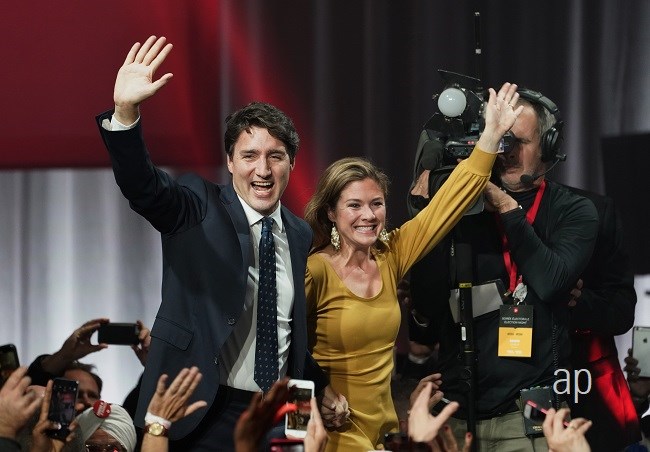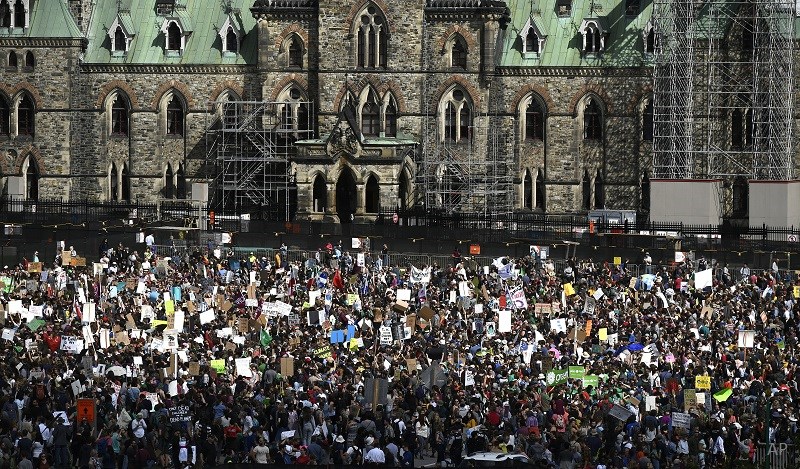
Prime Minister Justin Trudeau gets to keep his job, with the Liberal party winning 157 seats. Short of a majority, but enough to form a minority government, which is likely to be stable enough with the help of smaller parties – most likely the New Democratic Party, which won 24 seats, or the Bloc Quebecois, which won 32 seats.
“A Canadian House divided against itself can indeed stand, as a typical minority government runs about two years before it either loses support in the legislature or opts to go back to the voters for a mandate,” pointed out CIBC Capital markets’ chief economist Avery Shenfeld in a note. He expects that the results very slightly reduce the need for interest rate cuts by the Bank of Canada.
“While Canada has experienced majority governments for the last eight years, minority governments are not at all uncommon. Practically, this means that there will be less clarity on fiscal policy, with the Liberals' need for support likely to create plenty of horse trading,” said Robert Kavcic, Senior Economist, BMO Capital Markets.
Both Shenfeld and Kavcic believe the result was broadly expected, and there would be minimal impact on markets in the immediate term.
“While there are some residual political uncertainties, we’re not likely to see dramatic changes from the broad outlines of the Liberal platform, or for that matter, even from where policies were headed prior to the vote. We’ll await to see more from the Liberals, and the Bloc and NDP in terms of what they will be looking for to sustain their support. But the results are unlikely to engender any major market reactions given that they are in line with the final polling numbers that pointed to a Liberal minority as the most likely outcome,” Shenfeld said.
The NDP, which leans more left that the Liberals, especially on the climate and pipelines, have shown a willingness to back a Liberal minority government. The Bloc is anti-pipeline. However, any alliance begs the question, how will this government deal with a host of the issues raised on the campaign trail, including climate change, immigration, housing affordability, and, perhaps most crucially, energy and pipelines?
Energy and pipelines
The key difference between the Liberal and the other two platforms is the support for the Trans Mountain Pipeline, which the Liberals bought for $4.5 billion after Kinder Morgan walked away from the project last year. The NDP and Bloc are both anti-pipelines. The issue is particularly fraught, as the Liberals did not win a single seat in Alberta, with the Conservatives winning the province, except for one single seat won by the NDP.
It is unlikely that pipeline projects will get an easy pass, which will be a blow to the energy sector.
“Canada's shortage of economical takeaway infrastructure limits the sanctioning of the country's vast resource potential,” points out Morningstar analyst Joe Gemino, who calls the pipelines 'Canada’s lifelines'.
However, the morning after the election, incumbent Liberal Bill Morneau said the new government’s focus would be fiscal responsibility, and the government will push forward with the Trans Mountain pipeline expansion.
As of September, energy was the cheapest sector in Morningstar’s coverage universe. Gemino believes that ultimately, all three major pipelines will be built, though he points out that the main risk to Canadian oil stocks is pipeline expansion delays or cancellations.
Gemino’s top energy picks are Enbridge (ENB) and Cenovus (CVE).
Housing
Housing affordability was a major platform theme for all parties. The Liberals pledged to boost the cap on homes eligible for a 10% government-equity stake under the First-Time Home Buyers incentive to almost $800,000 in markets like Vancouver and Toronto. The NDP focused on building more supply of affordable housing.
“The Liberals are not introducing any big demand-side stimulus – so this should help keep prices stable for now,” says John Pasalis, President at Realosophy Realty, while noting that the First-Time Home Buyers Incentive is not likely to aid affordability in a major way.
“It had little pickup,” says Phil Soper, president and CEO at Royal LePage. However he says the co-investment model under the incentive could inspire some private interests to start their own offerings and help provide more buying power for first-timers.
But both Soper and Pasalis agree that going forward, the renewed Liberal government is stuck with a general housing volume crisis. “It’s not going to go away,” says Soper, adding that attention should also be paid to increasing supply and accessibility at the middle-market so that owners can sell their starter homes and then make them available to first-time buyers. “That will be the big ‘aha’ moment.”
Soper notes the Liberal pledge for 100,000 affordable homes won’t address the whole housing cycle as it targets the lower-end of the market – and that a holistic supply approach is needed. Pasalis adds “we’re at max capacity when it comes to construction” and that the question then might be “what are we building?” Adding to the rental supply will alleviate short term binds, but if rental prices respond by dipping it will affect investor psychology and motivations to purchase new urban units at pre-construction, starting a chain of events that could spell trouble for the market.
The banks believe the housing market will slow. “I think regulators have gotten to the soft landing for housing. The Canadian consumer is indebted, there is slowing global growth, and overall, we think that the Canadian banks and housing market will slow,” says Morningstar equity analyst Eric Compton.
Climate
The Liberals have a plan that’s been ‘tried and tested’, including incentives for both consumers and business, from green vehicle subsidies, to individual tax rebates aimed at offsetting a carbon tax that rises $10 each year to $50 a tonne in 2022. However, by the government’s own data, this plan won’t meet 2030 targets.
The Liberals have pointed out that indirect initiatives including investments in public transit and new technologies haven’t been fully considered in today’s estimates. On the campaign trail, the Liberals also announced that companies that produce or develop those zero emissions technologies would get a 50% discount on their corporate taxes, a $2bn tree planting program would be implemented, and we’d be net zero emissions nationally by 2050.





















